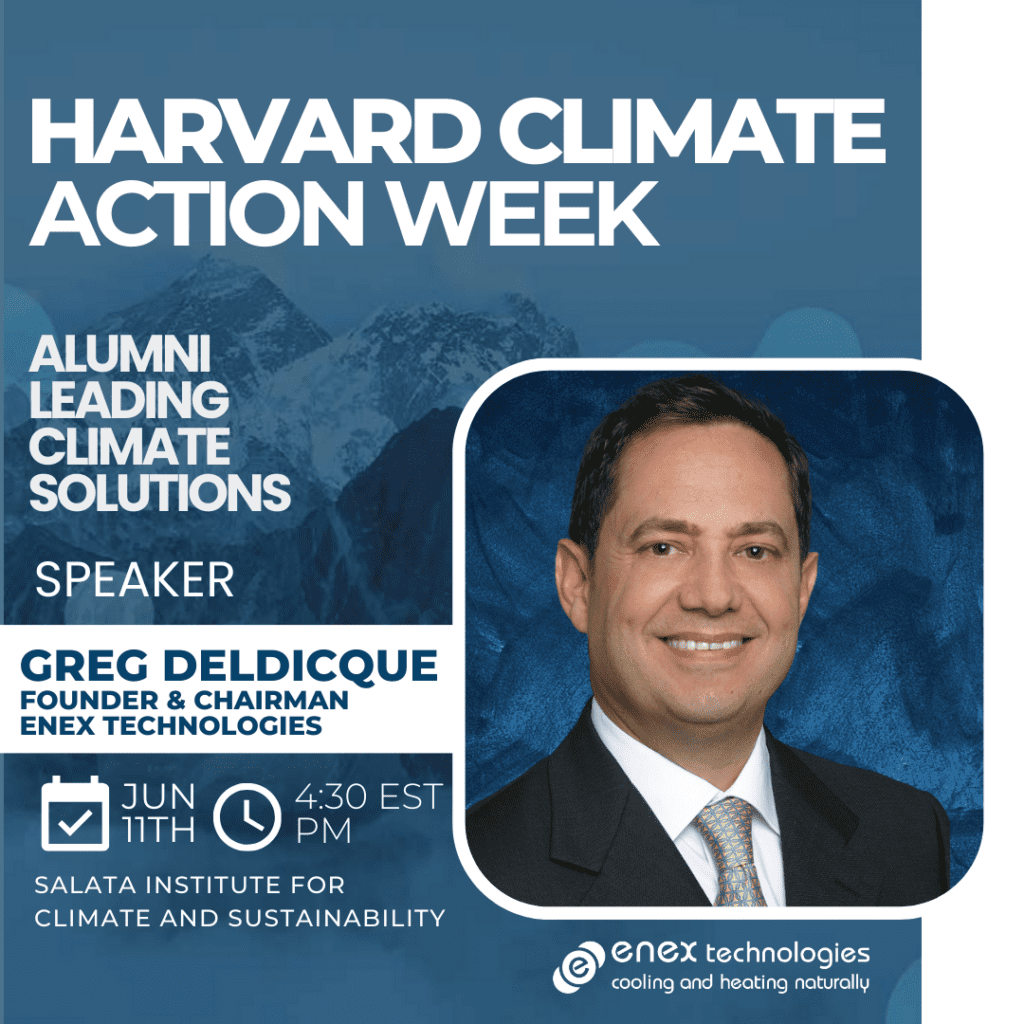
Harvard (USA), 13 June 2024 – Enex Technologies, Italian leader in natural refrigeration and Climate Tech solutions, was the only Italian company invited to the second edition of the Harvard Climate Action Week (10-14 June 2024).
The Founder and Chairman of Enex Technologies, Greg Deldicque, was the only representative of an Italian company among over 2,600 experts, activists, entrepreneurs and policymakers who met in 85 events.
Deldicque shared the vision of Enex Technologies in the closing session of the second day of the conference, entitled Leading Climate Solutions and chaired by Lindi von Mutius, Director of the Climate Action Accelerator Harvard Salata Institute for Climate and Sustainability. (here are the highlights of the panel)
According to Eurostat, EU buildings are responsible for 40% of energy consumption and 36% of greenhouse gas emissions in Europe. (source: Europarl). As the only Climate Tech company in the world with 400 years of combined history in cooling, heating, ventilation and refrigeration (“HVACR”) capable of offering solutions with the 4 available natural refrigerants (CO2, ammonia, propane and water), Enex Technologies was founded by industry veterans and pioneers in the field of natural refrigeration systems, with the aim of promoting energy-efficient solutions that reduce global warming and serve strategic buildings, including: supermarkets, cold rooms, hospitals, airports , hotels, data centers, industrial processes.
Greg Deldicque said in his speech: “Many of the conversations this week have been about how to manage and regulate the obvious externalities presented by climate change. HVACR is an industry that has historically and still uses fluorinated gases for the heat exchange process. These fluorinated gases are harmful, with a very high GWP (Global Warming Potential) compared to natural refrigerants and their leaks have a carbon footprint equivalent to that of all aviation. These fluorinated gases are also long-lasting chemicals that rain transports into wastewater, with dangerous effects on human health. Finally, HVACR is also essential for electrification, and in particular for the transition to electrically powered heat pumps.
Deldicque continues: “Most of us are here today because we understand that climate change poses an imminent threat to humanity. Of course, regulation must play a role in addressing externalities, but regulations alone will not lead us to this objective: technology must progress hand in hand. For example, Enex Technologeis expects the launch of 35 new natural refrigerant solutions in the next 18 months.“
We often hear the phrase “we must save our planet”. The reality is that our planet, which hosts us, will be fine, what is at risk is humanity as a species. Our extinction would not be the first.”
Eventually Deldicque concludes: “In terms of natural HVACR, Europe today is much more advanced than the US and Asia and is making impressive progress from both a technological and regulatory perspective. But I am encouraged by what I see in the United States: California, for example, is starting to take actions towards electrification and natural technologies and large American companies are contacting us because they know they need to transform their HVACR systems.”
Enex Technologies is based in Treviso. In 5 years, the company’s turnover has gone from 9 million in 2019 to 200 million expected for 2024, with 1,000 employees – 150 new jobs in Italy alone in the last 2 years, 12 factories throughout Europe and an organic growth of over 25%.
